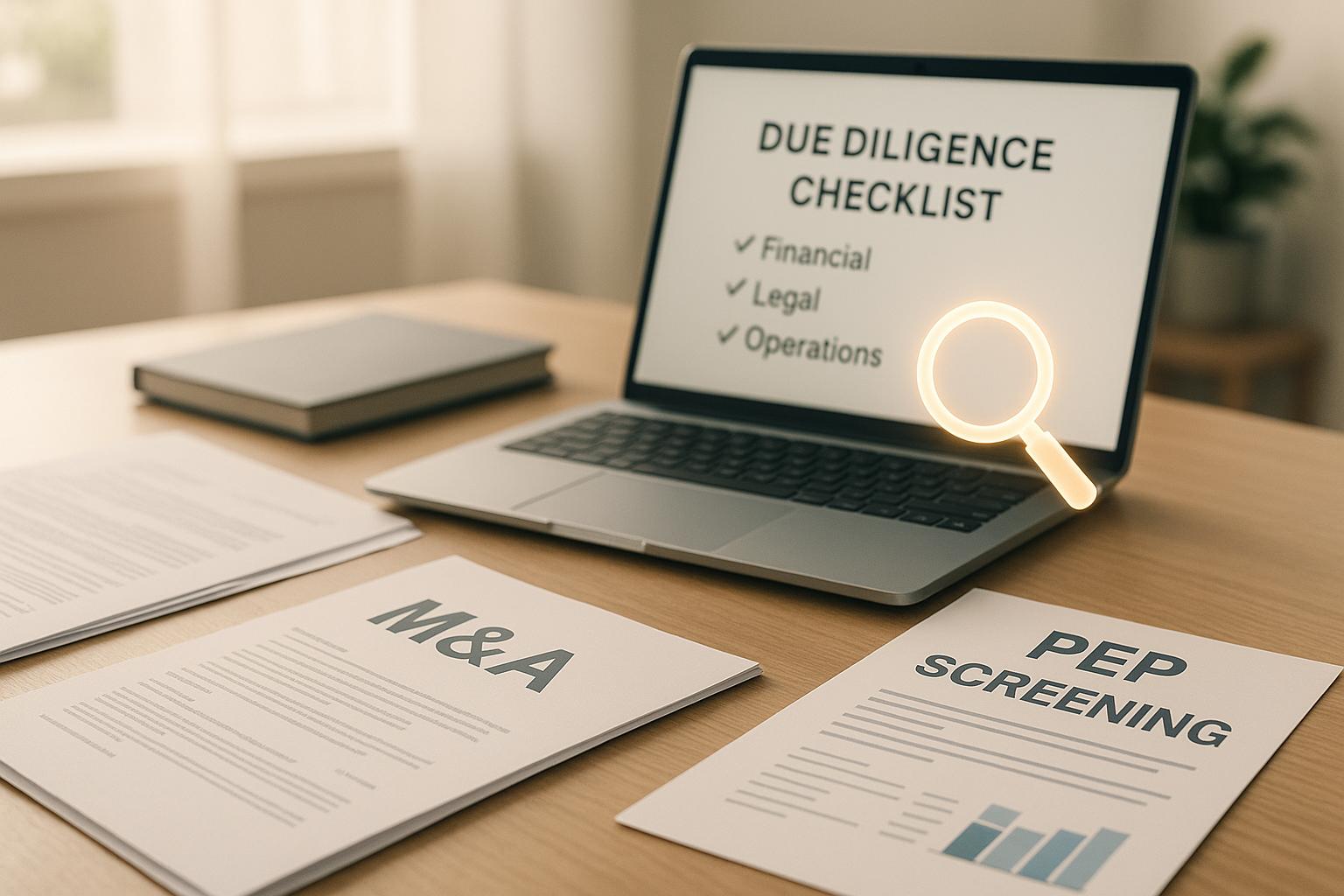How PEP Screening Impacts M&A Deals

PEP screening is a critical step in mergers and acquisitions (M&A) to manage risks tied to politically exposed persons (PEPs). These individuals, due to their public roles, are more prone to corruption, bribery, and money laundering, making thorough screening essential. Without it, companies face regulatory fines, reputational damage, and even deal failures.
Key takeaways:
- What is a PEP? A person holding or having held prominent public roles, including government officials, judges, or executives in state-owned enterprises. Screening also extends to their close associates.
- Why it matters: PEPs carry heightened financial crime risks, especially in cross-border deals where regulations vary.
- Risks of poor screening: Regulatory fines (e.g., HSBC’s $1.9 billion penalty in 2012), reputational harm (e.g., Danske Bank scandal), and deal delays or cancellations.
- Best practices: Use automated tools, conduct enhanced due diligence (EDD), and monitor PEP status continuously throughout the deal.
Thorough PEP screening ensures compliance, protects deal value, and minimizes disruptions during M&A transactions.
What Are Politically Exposed Persons (PEPs)
Grasping the concept of Politically Exposed Persons (PEPs) is a key part of successful M&A due diligence. These individuals can bring risks that might disrupt deals, so identifying and evaluating them properly is vital to ensuring smooth transactions.
PEP Definition
A PEP refers to someone who holds - or has held - a prominent public position, such as a government official, senior politician, high-ranking judge, military leader, or executive of a state-owned enterprise. This designation doesn’t imply wrongdoing but highlights their heightened susceptibility to financial crimes due to their authority and influence.
PEP screening often extends beyond the individual to include their family members and close associates. This broader approach acknowledges that corruption or money laundering schemes frequently involve multiple people connected to the primary PEP.
Common PEP roles include heads of state or government, senior politicians, top military officers, high-level judges, executives or board members of state-owned enterprises, and regulators. What ties these roles together is the power they hold over public resources, policy decisions, or regulatory systems.
This classification lays the groundwork for assessing risks, which vary depending on the individual’s role and location.
PEP Categories and Risk Levels
PEPs fall into three main categories, each carrying distinct risks for M&A transactions:
| PEP Type | Definition | Risk Level |
|---|---|---|
| Domestic PEPs | U.S. public officials, judges, military leaders, and executives of state-owned enterprises | Transparent but still high-risk |
| Foreign PEPs | Public officials, judges, military leaders, and state-owned executives from other countries | Highest risk |
| International Organization PEPs | Senior figures in international organizations like the UN, IMF, or World Bank | High risk |
Foreign PEPs are often the riskiest in M&A deals. They may operate in countries with weaker regulations or higher levels of corruption, making due diligence more challenging and exposing transactions to greater financial crime risks.
Domestic PEPs in the United States, while generally more transparent, still pose risks due to their influence over public resources and policies. Their involvement in deals involving government contracts or regulated industries demands extra scrutiny.
International Organization PEPs present a unique challenge. Operating across multiple jurisdictions, they often oversee significant financial resources and wield global influence, making them attractive targets for exploitation.
Another factor to consider is the duration of PEP status. Many organizations treat individuals as PEPs for years after they leave public office, especially if they retain influence or connections that could be misused. This reflects the reality that former officials often maintain networks that could be exploited.
U.S. and Global Regulatory Rules
PEP screening is guided by strict U.S. and global anti-money laundering (AML) frameworks. Once PEP roles are defined, understanding the regulatory landscape becomes essential. The Financial Action Task Force (FATF) sets global standards requiring enhanced due diligence for all PEP categories, shaping compliance practices worldwide.
In the United States, FinCEN regulations require mandatory screening of international PEPs and reporting of suspicious activities. Although screening domestic PEPs isn’t always required by law, it’s widely regarded as a best practice among financial institutions and advisory firms handling M&A transactions.
Enhanced Due Diligence (EDD) for PEPs involves deeper investigations into their financial history, sources of funds, business relationships, and any vulnerabilities. This includes thorough transaction monitoring and ongoing reviews throughout the deal process.
The regulatory approach varies by PEP category. For example:
- Foreign PEPs must undergo mandatory screening under U.S. rules.
- Domestic PEPs are not always required to be screened but are often evaluated as a precaution.
- International Organization PEPs fall into a gray area where screening is strongly encouraged and frequently required by company policies.
Failing to properly screen and monitor PEPs can lead to serious consequences. Regulatory fines for AML violations involving PEPs can reach hundreds of millions of dollars, especially for large financial institutions. Beyond financial penalties, poor PEP screening can damage reputations, create deal complications, and invite long-term regulatory scrutiny. Meeting these compliance standards is essential to safeguard transactions and avoid costly mistakes.
Risks of Poor PEP Screening in M&A
Skipping proper PEP screening in mergers and acquisitions (M&A) can lead to significant disruptions and long-term damage to a company's reputation. The risks aren’t just about missing compliance marks - they can affect regulatory standing and market confidence in serious ways.
Regulatory Penalties
One of the most immediate risks is facing steep regulatory penalties. U.S. regulators, such as FinCEN and other federal agencies, impose heavy fines for anti-money laundering (AML) violations. For example, in 2012, HSBC paid a staggering $1.9 billion fine due to AML failures, including lapses in PEP screening that let illicit funds flow through the bank.
But the consequences don’t stop at fines. Companies may face criminal charges, mandatory oversight, and a tarnished legal record, all of which complicate future growth. In the context of M&A, these penalties can impact both the acquiring and target companies, as well as individual executives. Such failures undermine the strict AML standards that are essential in any M&A deal.
Reputation Damage
The damage to reputation from inadequate PEP screening can be even harder to fix. When a company inadvertently aligns itself with corrupt officials or sanctioned individuals during an M&A transaction, the resulting media scrutiny and public backlash can destroy years of brand-building. Take the 2018 Danske Bank scandal, for instance: over €200 billion in suspicious transactions were tied to high-risk PEPs. This led to criminal investigations, executive resignations, and a massive loss of market value.
These associations don’t just hurt public perception - they also shake investor confidence. Institutional investors may hesitate to fund companies with tarnished reputations, making it harder to secure capital and grow.
Deal Complications
Undiscovered PEP risks can derail M&A deals entirely. If PEP-related issues come to light late in the process, regulatory approvals may be delayed as agencies demand additional documentation and analysis. These delays can stretch timelines and add over $1 million in extra legal and advisory fees.
Once a PEP connection is identified, enhanced due diligence becomes unavoidable. Legal teams and compliance experts often need to conduct deep background checks and forensic investigations, which can drag out the transaction even further. In some cases, the risks are so severe that the acquirer may decide to walk away from the deal altogether, leaving both parties with wasted resources and potential legal disputes.
Adding to the complexity, the interconnected nature of global financial systems means that a PEP issue flagged in one country can spark regulatory challenges in other jurisdictions. This ripple effect can escalate costs and make resolving the situation even more difficult.
Best Practices for PEP Screening in M&A
When it comes to mergers and acquisitions (M&A), inadequate screening for Politically Exposed Persons (PEPs) can lead to serious consequences. That’s why adopting a solid, technology-supported approach is essential to ensure thorough screening throughout the deal process.
Comprehensive Data Collection and Verification
Effective PEP screening starts with gathering accurate and thorough information about everyone involved in the transaction. This doesn’t just mean focusing on the obvious parties - it’s crucial to identify beneficial owners, senior management, board members, and even close family and associates of potential PEPs.
The Financial Action Task Force (FATF) emphasizes the importance of screening not only PEPs themselves but also their relatives and close associates. Why? Because these individuals are often used to hide illegal activities or assets. For example, a foreign official might use a spouse’s business or a friend’s investment vehicle to obscure the origin of funds. These connections are critical when assessing risk.
To ensure accuracy, verify identities using official documents and cross-reference them against global PEP and sanctions lists. If you uncover a PEP connection, enhanced due diligence (EDD) is required. This deeper dive involves investigating the source of funds, business relationships, and any warning signs of corruption or money laundering. Building a strong foundation with verified data is key to effectively leveraging technology in the screening process.
Leveraging Technology for Automated Screening
In today’s fast-paced M&A environment, relying on manual PEP screening is no longer practical. Automated screening tools can quickly and efficiently match names and entities against global databases, flagging potential risks while minimizing errors. These tools also provide real-time updates, ensuring no changes in PEP status go unnoticed.
Automation is particularly useful in large or international deals, where multiple entities across jurisdictions need to be screened against various regulatory databases. What might take weeks to complete manually can be done in hours with the help of technology, allowing your team to focus on analyzing flagged risks rather than sifting through endless records.
Screening should pull from a range of data sources, such as consolidated PEP lists, sanctions databases, law enforcement records, and adverse media reports. Casting a wide net ensures no relevant party is overlooked and strengthens the overall risk assessment process.
Negative media screening is especially valuable here. It uncovers reputational risks and potential signs of corruption or financial crimes that may not yet appear in official databases. This broader perspective helps you make more informed decisions about potential deal risks. Once risks are flagged, automated tools can also provide continuous monitoring to address emerging issues throughout the deal’s lifecycle.
Continuous Monitoring During the Deal
PEP screening isn’t a one-and-done task. Ongoing or periodic rescreening of all parties is critical to catch any changes in PEP status, new sanctions, or negative media that might arise during the transaction process.
For instance, someone who posed no risk at the start of negotiations might later take on a senior government role, or an existing PEP could face new sanctions or criminal investigations. These developments can significantly alter the risk profile of the deal.
Automated monitoring tools can send real-time alerts about such changes, enabling your team to act quickly. This might mean conducting additional due diligence, renegotiating deal terms, or even reconsidering the transaction altogether if the risks become too great.
Post-transaction monitoring is equally important, as it helps identify risks that could impact the merged entity’s compliance or reputation. This ongoing vigilance should be integrated into your broader compliance strategy, safeguarding your investment well beyond the deal’s closure.
Throughout the process, meticulous documentation is essential. Every screening step, risk evaluation, and mitigation measure should be recorded. Not only does this demonstrate compliance in case of regulatory scrutiny, but it also provides insights to refine your screening process for future deals.
sbb-itb-e766981
How Phoenix Strategy Group Supports PEP Screening in M&A
Phoenix Strategy Group understands that effective Politically Exposed Person (PEP) screening is a cornerstone of successful mergers and acquisitions (M&A). By combining deep M&A knowledge with cutting-edge technology, the firm ensures clients can meet regulatory obligations without slowing down the deal process. Their approach incorporates best practices in PEP screening, harnessing their expertise to protect deals and transform compliance into a strategic benefit.
Seamless Compliance Integration
Phoenix Strategy Group weaves PEP screening into its core M&A advisory processes, making compliance a natural part of transaction planning from the outset. During the early stages of deal evaluation, PEP screening runs alongside financial modeling and valuation efforts. This proactive step helps uncover regulatory risks early, reducing the chance of delays later in the process.
This integrated strategy ensures every relevant party - whether target executives or beneficial owners - is thoroughly assessed for PEP risks. The firm employs a combination of automated tools and manual verification to meet both U.S. FinCEN requirements and international FATF standards. By addressing compliance risks upfront, clients avoid last-minute surprises. Additionally, the firm’s detailed documentation and audit trails demonstrate thorough due diligence during regulatory reviews, creating a solid foundation for compliance.
Proprietary Data and Advanced Analytics
Phoenix Strategy Group uses proprietary databases that compile global PEP lists, sanctions data, and adverse media reports to create a robust risk assessment framework. Their machine learning algorithms detect patterns and connections that traditional methods might miss, allowing for the early identification of high-risk individuals or entities. This technology not only keeps up with the growing number of global PEPs but also minimizes false positives, enabling deal teams to focus their efforts where it matters most.
The firm goes beyond simple name matching, incorporating relationship mapping and beneficial ownership analysis. This comprehensive approach gives clients a full understanding of their compliance risks before finalizing a deal.
Case Example: Managing PEP Risk in a Growth-Stage M&A Deal
A recent case highlights how Phoenix Strategy Group’s approach mitigates PEP risks. The firm worked with a growth-stage technology company preparing for acquisition, conducting thorough PEP screening across senior management and key stakeholders. Their proprietary tools flagged a senior executive with potential PEP status due to prior advisory roles in government - something standard background checks had overlooked.
Through enhanced due diligence, the firm clarified the executive’s regulatory status and risk profile. Collaborating closely with the client, they introduced additional compliance measures, such as enhanced monitoring and updated internal controls. This proactive strategy not only satisfied regulatory requirements but also allowed the acquisition to move forward with transparency and confidence.
"PSG and David Metzler structured an extraordinary M&A deal during a very chaotic period in our business, and I couldn't be more pleased with our partnership."
- Lauren Nagel, CEO, SpokenLayer
This example underscores how Phoenix Strategy Group turns compliance challenges into opportunities, helping companies navigate M&A complexities with confidence and precision.
Conclusion: Reducing Risks with Proper PEP Screening
Thorough PEP screening is a cornerstone of successful M&A transactions, especially in today’s strict regulatory climate. As discussed earlier, neglecting this step can derail deals, exposing organizations to regulatory fines, reputational harm, and operational setbacks. For instance, Deutsche Bank’s compliance failures, including insufficient PEP screening, serve as a cautionary tale of the risks tied to inadequate due diligence.
By prioritizing PEP screening early in the M&A process, companies can significantly reduce these risks. Identifying politically exposed persons at the outset transforms compliance from a potential liability into a strategic tool that safeguards deal value and bolsters stakeholder trust.
With the rise of advanced analytics and AI, real-time screening against global watchlists has become more efficient and accurate. These technologies not only streamline the process but also cut down on false positives, making compliance efforts more effective than manual methods.
Key Takeaways
- Embed comprehensive data collection into every stage of the M&A process, not just during initial due diligence. Surveys indicate that over 60% of U.S. M&A professionals now rank PEP screening as a top compliance priority, highlighting its critical role in managing deal risks.
- Leverage automated screening tools and continuous monitoring to enhance risk management. Companies using these solutions report fewer compliance surprises and smoother interactions with regulators.
- Seek expert advisory support to navigate the complexities of PEP screening. Firms like Phoenix Strategy Group illustrate how combining proprietary data, advanced analytics, and M&A expertise can turn compliance challenges into competitive advantages.
- Adopt a risk-based approach tailored to individual transactions. Differentiating risk levels and maintaining thorough documentation ensures readiness for audits and regulatory reviews.
FAQs
What role does PEP screening play in reducing risks during M&A transactions?
PEP (Politically Exposed Person) screening plays a key role in maintaining compliance and managing risks during mergers and acquisitions. This process identifies individuals or entities with political influence who could bring potential legal, financial, or reputational challenges to the transaction.
Incorporating PEP screening into the due diligence process allows companies to spot hidden risks, stay aligned with regulatory requirements, and make well-informed decisions. Partnering with experienced financial and strategic advisors can make this process smoother and help minimize unexpected issues.
How do risk levels differ between domestic, foreign, and international PEPs in M&A transactions?
Politically Exposed Persons (PEPs) can present varying degrees of risk during mergers and acquisitions, depending on their background - whether they are domestic, foreign, or connected to international organizations.
- Domestic PEPs generally pose a lower level of risk. This is often due to the availability of local regulatory oversight and a better understanding of compliance standards within the same jurisdiction.
- Foreign PEPs, on the other hand, can bring more complexity. Their involvement introduces challenges tied to different legal frameworks, unfamiliar cultural practices, and geopolitical considerations.
- International organization PEPs carry their own set of risks, largely due to their global reach and the potential for scrutiny across multiple jurisdictions.
Properly understanding these distinctions is critical for navigating compliance and managing risks effectively in M&A transactions. Conducting thorough PEP screening early in the process helps identify potential issues, ensuring the deal remains secure and aligned with regulatory expectations.
Why is it important to continuously monitor PEP-related risks during and after an M&A deal?
Continuous tracking of PEP-related risks throughout and after an M&A transaction is crucial for staying compliant with regulations and safeguarding your investment. This process helps identify and respond to shifts in risk profiles, such as the emergence of new politically exposed persons (PEPs) or updates to regulatory requirements, in a timely manner.
Maintaining this level of vigilance helps reduce the chances of legal, financial, or reputational issues emerging after the deal, securing the transaction's long-term success.




